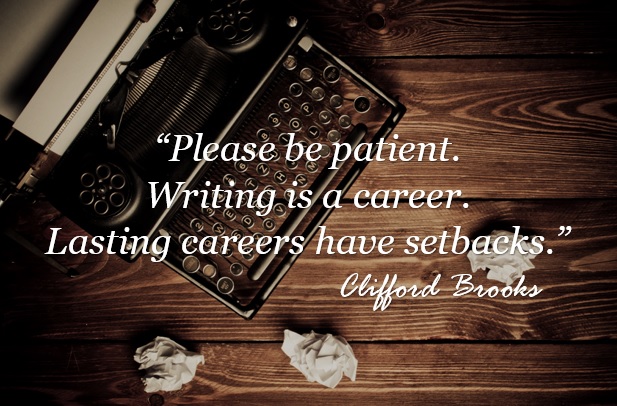
Writing is not a miserable lot fraught with loneliness, depression, and rejection. I find the act of writing therapeutic, liberating, and sometimes met with literary rejection. I think “rejection” is the wrong word. Unless you are in a monogamous relationship with some literary journal or publishing house, you’re not “rejected.” The person or persons in question politely “passed on your efforts.” The study of semantics does not make it sting any less. Yet, success does require a healthy perspective, thick skin, and guiding hand. In this blog post I want to be the last of these by offering 5 ways to deal with rejection.
- Process that Rejection Sucks, but a Necessary Evil: I cannot count how many times my work has failed to impress. With age I find it easier to read the hated line, “We appreciated reading your submission, but…” and not dip into anger, doubt, and/or plot for revenge. I take a deep breath, note the suck-factor, accept it, and then re-evaluate my efforts. You do not know the editor personally. He or she could’ve decided no one was getting in that day. Perhaps their ex has the same name as you. Then there’s the chance that maybe (just maybe) the product needs a tweak or two. If getting published came easy, anyone could do it. They can’t. You can.
- See this as a Second Chance: Second chances do not come often in life. We get them frequently in writing. This is a good thing. As mentioned above, a pass allows you to reassess word use, sentence structure, or find an overlooked grammatical error. Not getting published doesn’t mean the product is bad. There are a plethora of magazines to which you can submit. Do not allow one journal to throw you into a tailspin.
- Talk to Kindred Spirits: Misery loves company, but I love to laugh. Artists are an emotional, self-critical bunch. If you don’t have a creative tribe, find one. You’ve got your Schopenhauer/Eeyore brand, and then my flavor – the Montaigne/Winnie the Pooh peeps. Share your despair with folks who get it, but won’t let you mully-grub. A kind ear with an affectionate kick-to-the-rump will give you relief as well as a stirrup back-in-the-saddle.
- Workshop Your Product: I cannot stress how important it is to workshop your writing. Find a group who are serious about craft. If it’s guided by an instructor, make sure he or she is published. “Those who can’t do, teach,” is a tragically flawed mode of thinking. If your work doesn’t make the cut and you can’t see the problem, take it back to those who will give you constructive criticism without tearing you down. Your support system is also your trade school in the right situation.
- Be Patient: As a novice, when I received bad news, I let my temper get the best of me. I cursed, pouted, and then rushed to submit another poem to the same people, or the same poem to another magazine. That never proved a useful practice. “Be patient” can be irritating to hear, an annoying song, but it’s the crux of a deeper sense of calm and more productive creative life. Please be patient. Writing is a career. Lasting careers have setbacks. Anything done out of anger will not make you happy.
Above all else, remember not to take it personally. A thumb down is not a jab at your integrity, talent, or mother’s good name. I don’t like it. You don’t like it. However, I do hold firm to the mantras: Easy come, easy go. Anything worth having is worth the sacrifice. I hope that these 5 ways to deal with rejection help you face the day with a little less stress. We are solitary creatures, but you are never alone.
